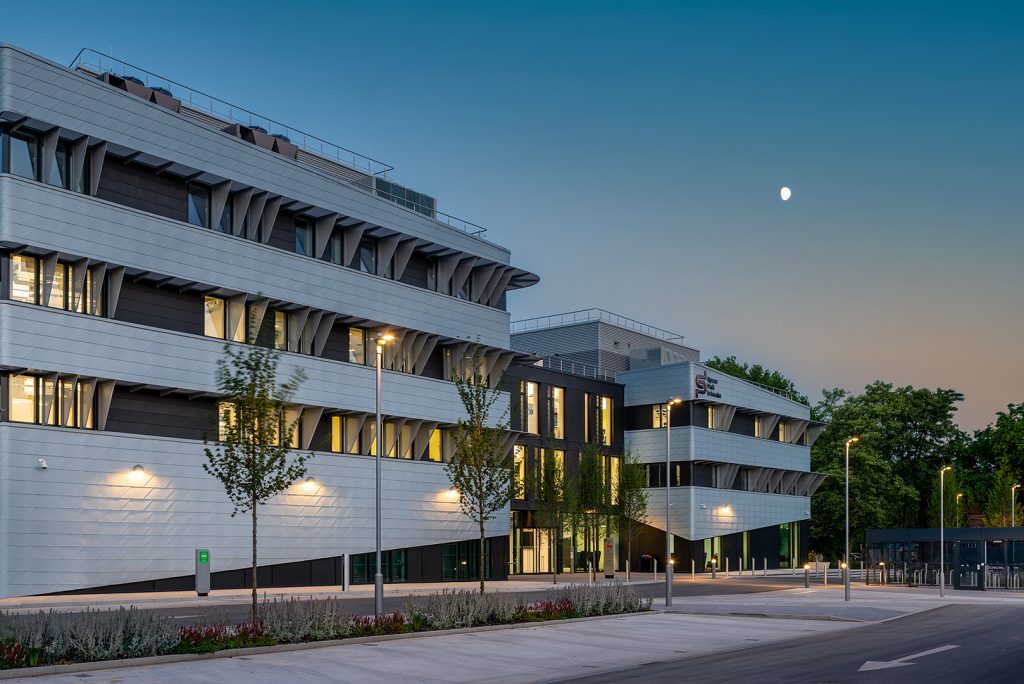Leicester “leads the way” on new National Space Strategy

The University of Leicester has today (Monday) welcomed publication of the UK Government’s new National Space Strategy.
The approach has been formed with input from space scientists and experts based at the University of Leicester and Space Park Leicester, plus other key players in the UK space sector, to create a 10-point plan for the UK’s contribution in space.
Leicester research and innovation in space plays a major role in the UK space sector, with Space Park Leicester expected to boost the regional economy by £750m a year and create 2,500 jobs while supporting many of these new national objectives.
The University of Leicester has a long-standing space heritage stretching back more than six decades.
Responding to the announcement, Professor Sarah Davies, Pro Vice-Chancellor and Head of College for Science and Engineering at the University of Leicester, said:
“This ambitious new National Space Strategy is fantastic news, as it recognises the cutting-edge research and innovation taking place at both the University of Leicester and Space Park Leicester and our contribution to the national space sector.
“As we celebrate our Centenary year, we not only have the opportunity to reflect on our first 100 years – much of which has been shaped by Leicester advances in space – but to look ahead to our next Century and our future in this area.
“We are most pleased to see that many of the areas backed by this new 10-point plan are those in which we are already leading the way, not only in the UK, but on a global stage. We are hugely excited to continue to contribute to the UK’s increased presence in space science, exploration and innovation.”
The National Space Strategy, presented at the UK Space Conference, is based around four cross-cutting pillars:
- Unlocking growth in the UK space sector – supporting UK businesses, researchers, and innovators to grow the space sector and level up the UK economy.
- Collaborating internationally with partners and allies – demonstrating global leadership, and becoming an international partner of choice in space activities.
- Growing the UK as a science and technology superpower – continuing to collaborate in high profile space missions and backing space technologies to tackle global challenges such as climate change.
- Developing resilient space capabilities and services – ensuring critical national infrastructure can rely on a wide range of resilient space technologies and delivering the UK Defence Space Portfolio to strengthen UK security at home and overseas.
Space Park Leicester is delivered by the University of Leicester with a number of regional, national and international partners. Funders include the European Union (EU)’s European Regional Development Fund, Leicester and Leicestershire Enterprise Partnership (LLEP), Leicester City Council, The Wolfson Foundation, UK Research and Innovation (UKRI) and the Natural Environment Research Council (NERC).
Partners to date include the neighbouring National Space Centre, European Space Agency (ESA), Airbus and ThalesAlenia Space, among others.
Space Park Leicester also hosts the national headquarters of the NERC-funded National Centre of Earth Observation (NCEO).
In addition, the University is leading a multi-partner bid for a new Leicester and Leicestershire Institute of Technology (IoT) centred on the themes of space, advanced manufacturing, engineering and digital skills.
If successful, the IoT will offer training opportunities for local people, help employers to meet skills needs, create jobs, and boost growth and productivity in the local economy as well as supporting the delivery of specialist skills and education elsewhere in the UK.
Science and Innovation Minister George Freeman said:
“As we enter an exciting new space age, we have bold ambitions for the UK to be at the vanguard of this industry in our role as a science superpower – whether it’s launching the first satellite from British soil, or leading major international space missions to help combat climate change.
“Today’s National Space Strategy sets out our vision for ensuring that our thriving space sector lifts off for the long term. It will put rocket boosters under the UK’s most innovative space businesses, ensuring they can unlock private capital and benefit our home-grown space expertise.
“Above all, by integrating our commercial and military space activities, we will use space to protect British interests abroad and on home soil, establishing the UK as one of the most attractive and innovative space economies in the world.”
Phase 1 of Space Park Leicester opened earlier this year, with Phase 2 laboratories, workshops, offices and other specialist spaces expected to come online in January 2022.
There are also plans for a further development on the Leicester site, with a commercial Low Cost Access to Space (LoCAS) payload, space system and small satellite manufacturing facility.
LoCAS will address the UK’s need for capacity to build payloads and space systems for constellations and will provide a pipeline for burgeoning UK launch services, lower the barriers to new entrants in the market and support the development of new business models for downstream services.
Professor Richard Ambrosi is a Professor of Space Instrumentation and Space Nuclear Power Systems at the University of Leicester and Representative on the Universities Space Research Association (USRA) Council of Institutions. He added:
“Space Park Leicester is set to provide state-of-the-art, high-tech facilities for research, development and manufacturing. We are already home to research experts and companies covering end-to-end capabilities, from satellite design and engineering, through to downstream data and its applications.
“This creates unmatched opportunities for the collaboration which makes Leicester such an important hub for the UK space sector.”
The full National Space Strategy is available to view on gov.uk.


